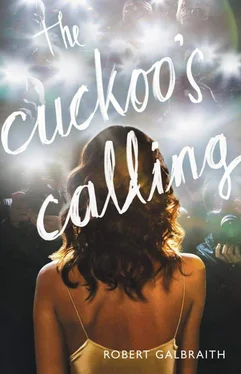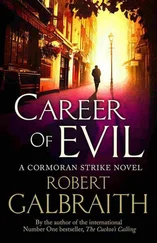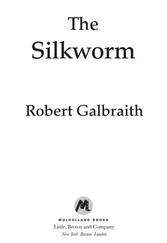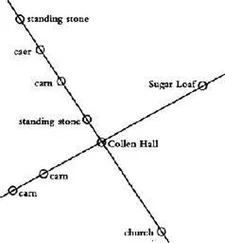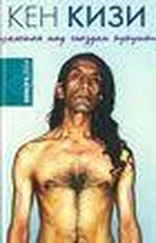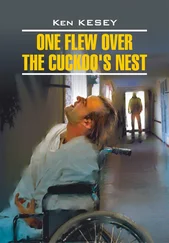“But never mind, John. If your defense team can’t find a personality disorder for you, I expect they’ll argue that your upbringing’s to blame. Unloved. Neglected. Overshadowed. Always felt hard done by, haven’t you? I noticed it the first day I met you, when you burst into those moving tears at the memory of Lula being carried up the drive into your home, into your life. Your parents hadn’t even taken you with them to get her, had they? They left you at home like a pet dog, the son who wasn’t enough for them once Charlie had died; the son who was about to come a poor second all over again.”
“I don’t have to listen to this,” whispered Bristow.
“You’re free to leave,” said Strike, watching the place where he could no longer make out eyes in the deepening shadows behind Bristow’s glasses. “Why not leave?”
But the lawyer merely sat there, one knee still jiggling up and down, his hands sliding over each other, waiting to hear Strike’s proof.
“Was it easier the second time?” the detective asked quietly. “Was it easier killing Lula than killing Charlie?”
He saw the pale teeth, bared as Bristow opened his mouth, but no sound came out.
“Tony knows you did it, doesn’t he? All that bullshit about the hard, cruel things he said after Charlie died. Tony was there; he saw you cycling away from the place where you’d pushed Charlie over. Did you dare him to ride close to the edge? I knew Charlie: he couldn’t resist a dare. Tony saw Charlie dead at the bottom of that quarry, and he told your parents that he thought you’d done it, didn’t he? That’s why your father hit him. That’s why your mother fainted. That’s why Tony was thrown out of the house after Charlie died: not because Tony said that your mother had raised delinquents, but because he told her she was raising a psychopath.”
“This is—No,” croaked Bristow. “No!”
“But Tony couldn’t face a family scandal. He kept quiet. Panicked a bit when he heard they were adopting a little girl, though, didn’t he? He called them and tried to stop it happening. He was right to be worried, wasn’t he? I think you’ve always been a bit scared of Tony. What a fucking irony that he backed himself into a corner where he had to give you an alibi for Lula’s murder.”
Bristow said nothing at all. He was breathing very fast.
“Tony needed to pretend he was somewhere, anywhere, other than shacked up in a hotel with Cyprian May’s wife that day, so he said he doubled back to London to go and visit his sick sister. Then he realized that both you and Lula were supposed to have been there at the same time.
“His niece was dead, so she couldn’t contradict him; but he had no choice but to pretend he saw you through the study door, and didn’t talk to you. And you backed him up. Both of you, lying through your teeth, wondering what the other one was up to, but too scared to question each other. I think Tony kept telling himself he’d wait until your mother died before he confronted you. Perhaps that’s how he kept his conscience quiet. But he’s still been worried enough to ask Alison to keep an eye on you. And meanwhile, you’ve been feeding me that bullshit about Lula hugging you, and the touching reconciliation before she returned home.”
“I was there,” said Bristow, in a rasping whisper. “I was in my mother’s flat. If Tony wasn’t there, that’s his affair. You can’t prove I wasn’t.”
“I’m not in the business of proving negatives, John. All I’m saying is, you’ve now lost every alibi except your Valium-addled mother.
“But for the sake of argument, let’s assume that while Lula’s visiting your groggy mother, and Tony’s off fucking Ursula in a hotel somewhere, you’re still hiding out in Flat Two, and starting to think out a much more daring solution to your cash-flow problem. You wait. At some point you put on the black leather gloves that have been left in the wardrobe for Deeby, as a precaution against fingerprints. That looks fishy. Almost as though you’re starting to contemplate violence.
“Finally, in the early afternoon, Lula comes back home, but unfortunately for you—as you no doubt saw through the peephole of the flat—she’s with friends.
“And now,” said Strike, his voice hardening, “I think the case against you starts to become serious. A defense of manslaughter—it was an accident, we tussled a bit and she fell over the balcony—might have held water if you hadn’t stayed downstairs all that time, while you knew she had visitors. A man with nothing worse on his mind than bullying his sister into giving him a large check might, just might, wait until she was alone again; but you’d already tried that and it hadn’t worked. So why not go up there when she was, perhaps, in a better mood, and have a go with the restraining presence of her friends in the next room? Maybe she’d have given you something just to get rid of you?”
Strike could almost feel the waves of fear and hatred emanating from the figure fading into the shadows across the desk.
“But instead,” he said, “you waited. You waited all that evening, having watched her leave the building. You must have been pretty tightly wound by then. You’d had time to formulate a rough plan. You’d been watching the street; you knew exactly who was in the building, and who wasn’t; you’d worked out that there might just be a means of getting clean away, without anyone being the wiser. And let’s not forget—you’d killed before. That makes a difference.”
Bristow made a sharp movement, little more than a jerk; Strike tensed, but Bristow remained stationary, and Strike was acutely aware of the unattached prosthesis merely resting against his leg.
“You were watching out of the window and you saw Lula come home alone, but the paparazzi were still out there. You must have despaired at that point, did you?
“But then, miraculously, as though the universe really did want nothing more than to help John Bristow get what he wanted, they all left. I’m pretty sure that Lula’s regular driver tipped them off. He’s a man who’s keen to forge good contacts with the press.
“So now the street’s empty. The moment has arrived. You pulled on Deeby’s hoodie. Big mistake. But you must admit, with all the lucky breaks you got that night, something had to go wrong.
“And then—and I’m going to give you full marks for this, because it puzzled me for a long time—you took a few of those white roses out of their vase, didn’t you? You wiped the ends dry—not quite as thoroughly as you should have done, but pretty well—and you carried them out of Flat Two, leaving the door ajar again, and climbed the stairs to your sister’s flat.
“You didn’t notice that you’d left a few little drops of water from the roses, by the way. Wilson slipped on them, later.
“You got up to Lula’s flat, and you knocked. When she looked through the peephole, what did she see? White roses. She’d been standing on her balcony, with the windows wide open, watching and waiting for her long-lost brother to come down the street, but somehow he seems to have got in without her seeing him! In her excitement, she throws open the door—and you’re in.”
Bristow was completely still. Even his knee had stopped jiggling.
“And you killed her, just the same way you killed Charlie, just the same way you later killed Rochelle: you pushed her, hard and fast—maybe you lifted her—but she was caught by surprise, wasn’t she, just like the others?
“You were yelling at her for not giving you money, for depriving you, just as you’ve always been deprived, haven’t you, John, of your portion of parental love.
“She yelled at you that you wouldn’t get a penny, even if you killed her. As you fought, and you forced her across her sitting room towards that balcony and the drop, she told you she had another brother, a real brother, and that he was on his way, and that she’d made a will in his favor.
Читать дальше
